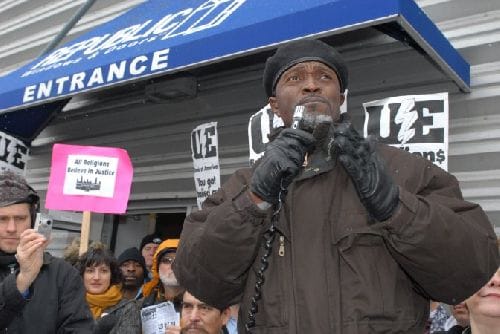Monday, March 30, 2009
Action request: Help the Underdogs Pull off the Upset
This time of year, much attention is being paid to college superstars on the court. CBS paid the NCAA $6 billion to air the NCAA tournament. College coaches enjoy six and seven figure salaries. College athletes are taken care of by universities while getting their education--or are they?
College athletes who have worked hard on the court and in the classroom are often left to foot the bill for medical expenses from sports-related injuries, have their scholarships taken away for any reason, and often find themselves scrambling to make ends meet when scholarship funds fall short of the real cost of school--all while the NCAA generates billions from their talent.
These exploited workers do not yet have the right to form a union; but there is one organization giving college athletes a voice. The National College Players Association (NCPA) is the only group working to change these injustices. The NCPA is made up of 10,000 current and former college athletes and has already achieved significant victories nationwide.
NCPA fights for basic protections like making sure college athletes can get the education they've been promised and have worked so hard for.
Speak up against a multi-billion dollar industry that refuses to put promises made to workers in writing, pay for on-the-job injuries, or can revoke your salary at anytime, without reason.
Join unions and fans of college sports in signing a petition that will go to the NCAA and its three top corporate sponsors: Pontiac (GM), AT&T and Coke. Let them know that a fraction of these billions of dollars in sponsorship money should be used to provide basic protections to college athletes.
Speak up and sign the petition here.
JWJ Chicago organizer on Bill Moyers show

Bill Moyers recently interviewed James Thindwa, African-American JOBS with JUSTICE organizer, who has organized for several recent campaigns including the factory occupation at Republic Windows and Doors, the Chicago Living Wage Campaign, and the Employee Free Choice Act struggle (and his experience in the anti-colonial, independence struggle in Zimbabwe). See link below.
Sunday, March 29, 2009
An economy that works for everyone
Jobs with Justice and student groups have hundreds of events planned from March 27-April 4 around the themes "Resistance & Recovery" and "Resist and Reclaim our Future."
Here's how you can participate in and support these actions:
3) Find a student-led action near you
The Development, Relief and Education for Alien Minors (DREAM) Act, reintroduced in Congress yesterday, is bipartisan legislation that addresses the situation faced by young people who were brought to the United States years ago as undocumented immigrant children, and who have since grown up here, stayed in school, and kept out of trouble.
If passed, the DREAM Act would facilitate access to college for immigrant students in the U.S. by restoring states’ rights to offer in-state tuition to immigrant students residing in their state. The “DREAM Act” would also provide a path to citizenship for hardworking immigrant youth who were brought to the U.S. as young children and to pursue higher education or military service, enabling them to contribute fully to our society.More about the DREAM Act:
Each year, about 65,000 U.S.-raised students who would qualify for the DREAM Act graduate from high school. These include honor roll students, star athletes, talented artists, homecoming queens, and aspiring teachers, doctors, and U.S. soldiers. They are young people who have lived in the U.S. for most of their lives and desire only to call this country their home. Even though they were brought to the U.S. years ago as children, they face unique barriers to higher education, are unable to work legally in the United States, and often live in constant fear of detection by immigration authorities.
Our immigration laws currently have no mechanism to consider the special equities and circumstances of such students. By enacting the DREAM Act, Congress would legally recognize what is de facto true: these young people belong here. DREAM Act students should be allowed to get on with their lives.
If Congress fails to act this year, another entire class of outstanding, law-abiding high school students will graduate without being able to plan for the future, and some will be removed from their homes to countries they barely know. This tragedy will cause America to lose a vital asset: an educated class of promising immigrant students who have demonstrated a commitment to hard work and a strong desire to be contributing members of our society.
Let's bring these students out of the shadows, out from underground. Tell President Obama and Congress to pass the DREAM Act in 2009. Talented students and their families living in fear of raids and ripped apart by deportations, cannot afford to wait for change.
Friday, March 20, 2009
Salem Jobs with Justice Anti-Sweatshop Event on April 2
Calling on Oregon to end tax dollar support for sweatshops and to help build an economy based on good jobs!
SweatFree Communities presents
"Economic Stimulus Tour"
Thursday, April 2, 5:30-6:30 PM
St Vincent de Paul Catholic Church
1010 Columbia St NE
Salem, Oregon
Free and open to the public. Light refreshments will be served. Bi-lingual event: Spanish and English.
Hear from garment workers:
Elizabeth Gutierrez Reyes, from Honduras, worked 15 years in garment factories and has witnessed human rights violations at a factory for the popular Dickies brand, which provides public employee uniforms to many local governments. She is now a leader with FESITRADEH, a Honduran labor federation.
Rafael Irizarry, from Puerto Rico, has worked for 5 years at Propper International, a major producer of military and law enforcement apparel that supplies San Francisco, Seattle, and Washington State, among others. He is a lead plaintiff in a lawsuit against Propper for damages of $225,000 related to unpaid work, alleging that the company did not grant legally required paid sick days and vacation days.
Sponsored by Alianza, Salem Jobs with Justice, Sweatfree Northwest

